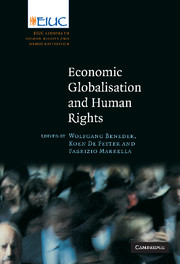Book contents
- Frontmatter
- Contents
- List of contributors
- Series editors' preface
- Preface
- List of abbreviations
- Introduction
- PART I Inter-disciplinary Perspectives on Human Rights and Economic Globalisation
- PART II The Relevance of Human Rights for International Economic Organisations
- PART III International Corporate Accountability
- Index
Introduction
Published online by Cambridge University Press: 09 July 2009
- Frontmatter
- Contents
- List of contributors
- Series editors' preface
- Preface
- List of abbreviations
- Introduction
- PART I Inter-disciplinary Perspectives on Human Rights and Economic Globalisation
- PART II The Relevance of Human Rights for International Economic Organisations
- PART III International Corporate Accountability
- Index
Summary
This book analyses the relationship between economic globalisation and human rights. It raises two main issues. How can human rights provide protection whenever economic globalisation threatens human dignity? Secondly, should human rights themselves evolve in response to a changing global economy? The main purpose of this opening section is to indicate how subsequent chapters address these questions.
Defining the terms
While the authors in this book use a common concept of human rights, it is less certain that they share a common understanding of economic globalisation. This is not surprising. Although both concepts are contentious, there is at least a legal definition of human rights around which all contributors can rally. For many authors there is no need to explicitly define economic globalisation, as they only deal with a specific aspect (such as the liberalisation of trade, or the human rights impact of companies) rather than with the phenomenon as a whole.
By human rights, the contributors mean the rights included in the core international human rights instruments adopted by the United Nations. With the exception of the Migrant Workers' Convention, these treaties have been widely ratified. Non-ratifying states are still bound by human rights law to the extent that human rights have become part of customary international law. Both the International Court of Justice and the international criminal tribunals have asserted in their case law that (a number of) human rights have achieved the status of international customary law.
- Type
- Chapter
- Information
- Economic Globalisation and Human RightsEIUC Studies on Human Rights and Democratization, pp. 1 - 14Publisher: Cambridge University PressPrint publication year: 2007



